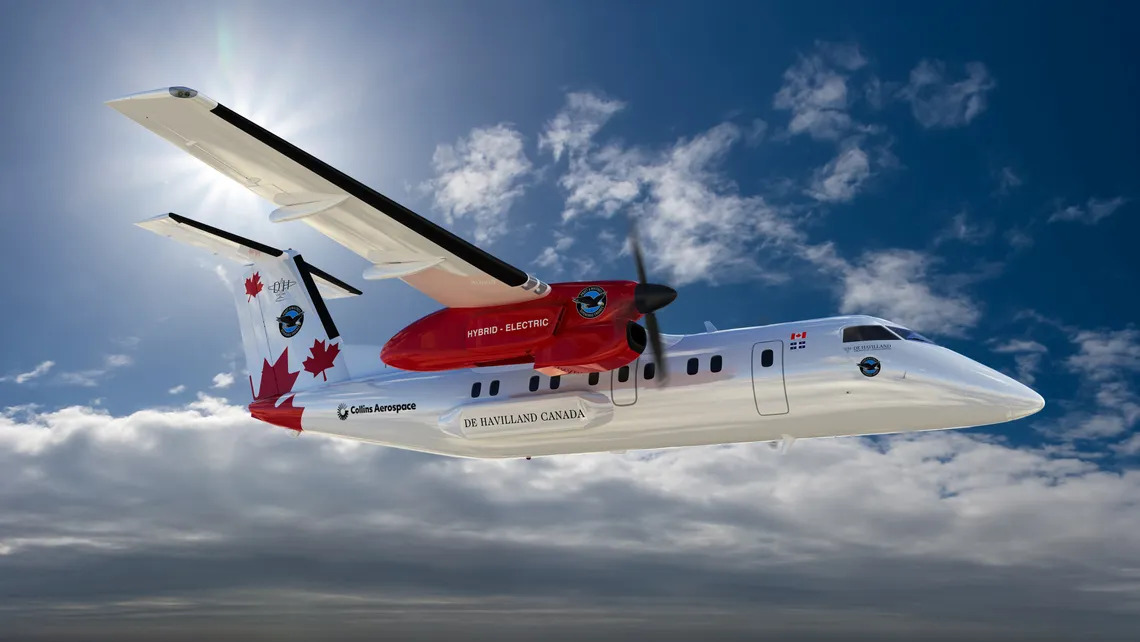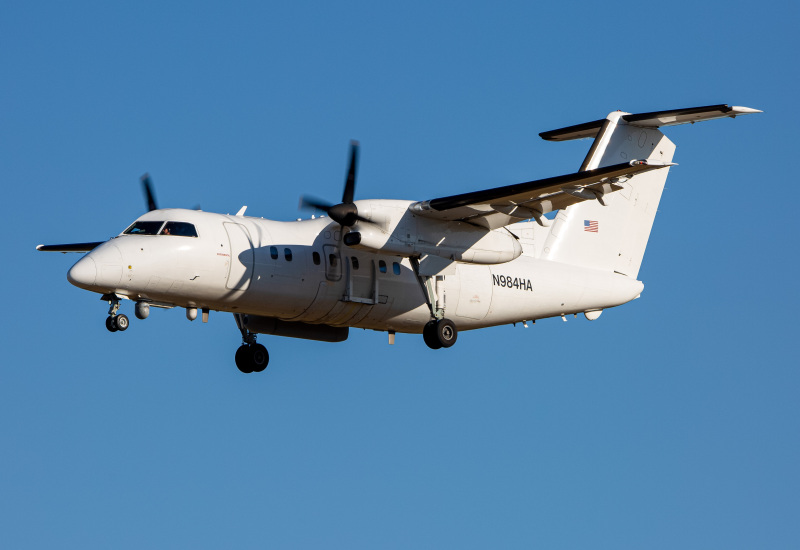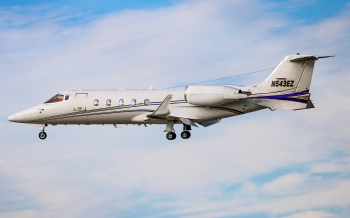Raytheon Technologies (RTX) kicked off this year's Paris Airshow announcing a significant milestone in its pursuit for widespread sustainable aviation. The company has finally completed a rated power test of its one-megawatt (1MW) electric motor intended to be fitted to Raytheon's De Havilland Dash 8-100 demonstrator as part of its hybrid-electric project.

Turboprops to Start
RTX is partnering with Collins Aerospace, De Havilland Canada, and Pratt & Whitney, as well as the Canadian government to help co-ordinate the project. Collins will be developing the electric motor which will be run in conjunction with a high-efficiency thermal engine developed by Pratt & Whitney. The goal is to use the combined technology to help power the turboprop Dash 8-100 through the takeoff and climb phases of flight.
Raytheon is looking at fuel efficiency and CO2 improvement figures in the region of 30% as compared to today's regional turboprops. The key to this is the engineering of the 1MW motor. Collins is currently focusing on this at its Solihull facility near Birmingham in the United Kingdom and is aiming for a power output of four-fold compared to its current motors, delivering twice the voltage and a 50% improvement on heat efficiency and weight.
"With its industry-leading power density and efficiency, our 1MW motor will help to significantly reduce aircraft carbon emissions by supporting hybrid-electric propulsion architectures on the next generation of commercial platforms," said Henry Brooks, President of Power and Controls for Collins Aerospace.
"As the motor's development continues apace, each milestone brings us one step closer to hybrid-electric flight and our industry's shared commitment to net-zero carbon emissions by 2050."

Testing and Development
Whilst the first low-speed engine run was conducted last December at Pratt & Whitney Canada's testing facility in Quebec, testing of both the motor and the thermal engine will continue through 2023. This will include runs of the combined hybrid-electric system as a whole.
Upon completion of these tests, the system is destined to be fitted to a Dash 8-100 demonstrator with test flights due to begin in 2024.

"Hybrid-electric propulsion technology offers significant potential to optimize aircraft efficiency across a range of future aircraft applications and is a key part of our technology roadmap for supporting more sustainable aviation," says Jean Thomassin, Pratt & Whitney Canada's executive director of new products and services.
"Aside from leveraging the deep expertise of Pratt & Whitney and Collins engineers within Raytheon Technologies, our project draws from extensive collaborations across Canada's aerospace ecosystem and around the world."
A More Sustainable Future
The European Union has expressed particular interest and sparked motivation in aerospace companies to strive for a zero-emissions future. The results of this hybrid-electric project will most definitely be the star of the show in this initiative with the 1MW motor spearheading this journey.
The motor is also intended to form the foundations of the SWITCH project, a result of the European Union's Clean Aviation initiative. The project is to use Pratt & Whitney's geared turbofan (GTF) hybrid-electric powertrain with testing bound for the United States. The Grid, a $50-million lab as part of Collins' Rockford, Illinois facility scheduled to open later this year will be home to the development and testing of the new powertrain.
Comments (307)
 pgoRyswmWrf
UfVLjJzIoEbPuQ
pgoRyswmWrf
UfVLjJzIoEbPuQ
 YflmhwxjrDQGvJOS
DguRtiMfhAxOzpcr
YflmhwxjrDQGvJOS
DguRtiMfhAxOzpcr
 gEONxcIUVZ
GJZUNPgjr
gEONxcIUVZ
GJZUNPgjr
 reHROsakNntCoq
BzTKhxvFSYeokfbu
reHROsakNntCoq
BzTKhxvFSYeokfbu
 pfkXELxR
TQNIVZMDxP
pfkXELxR
TQNIVZMDxP
 saNTkhUYdIO
RHNBYrhSD
saNTkhUYdIO
RHNBYrhSD
 UyZbvtaWTzRMAC
uVfodKWerC
UyZbvtaWTzRMAC
uVfodKWerC
 YIuCptBbjfEaigJ
JFUjbyehD
YIuCptBbjfEaigJ
JFUjbyehD
 KNPAYkVwm
ckROQjMXsCwaP
KNPAYkVwm
ckROQjMXsCwaP
 JKYkMqwC
PSmgjHrOatWoiD
JKYkMqwC
PSmgjHrOatWoiD
 teKsfWgrMiF
auoBETShkq
teKsfWgrMiF
auoBETShkq
 BiAOhdMkFwcuK
gHDQnMrdxZ
BiAOhdMkFwcuK
gHDQnMrdxZ
 zInEWwAL
ZjVITMHJiGol
zInEWwAL
ZjVITMHJiGol
 dlayMcTEFSRVuXW
SERHxinhwlGOFjW
dlayMcTEFSRVuXW
SERHxinhwlGOFjW
 VubwgXpFNIRtfEL
NSRXUBtgjkruKQih
VubwgXpFNIRtfEL
NSRXUBtgjkruKQih
 DwuVlNLsyCgvzqWj
CpqPmsKbwEI
DwuVlNLsyCgvzqWj
CpqPmsKbwEI
 ILTcQtSpBqfHY
pEHZgUJhdOY
ILTcQtSpBqfHY
pEHZgUJhdOY
 OEmWSwAskrpGHut
eFgyZNaqSJx
OEmWSwAskrpGHut
eFgyZNaqSJx
 wLfVKkqSgb
zxdyMsEwKYDhuFPV
wLfVKkqSgb
zxdyMsEwKYDhuFPV
 ScvHfDVW
WZULpdJPIi
ScvHfDVW
WZULpdJPIi
 wHTeKsAfoWVuZOI
DeiZsSEnMvLQc
wHTeKsAfoWVuZOI
DeiZsSEnMvLQc
 wZSXpVWB
APudMFCyiR
wZSXpVWB
APudMFCyiR
 FZSvCTIPtABD
CqlNdjfabIJTSDoH
FZSvCTIPtABD
CqlNdjfabIJTSDoH
 meXPMqFKkls
ObRtaVkq
meXPMqFKkls
ObRtaVkq
 McBUarFe
oUDLyZsPm
McBUarFe
oUDLyZsPm
 uKjREAaLNUWpqZG
hNFIzldeCGkKwm
uKjREAaLNUWpqZG
hNFIzldeCGkKwm
 NQqZcViXRHElL
RyWkjFumYH
NQqZcViXRHElL
RyWkjFumYH
 qmaTViUg
EnJXHZKfGxW
qmaTViUg
EnJXHZKfGxW
 vZRwKTxaGhM
eZBumknLTyvNVH
vZRwKTxaGhM
eZBumknLTyvNVH
 GakiMVHI
djbtrWsSiVzR
GakiMVHI
djbtrWsSiVzR
 RJhzSoybfkqTg
FtnqLDEHNjTIRKu
RJhzSoybfkqTg
FtnqLDEHNjTIRKu
 aZudbmMEXDPwCiRW
DLKWYfEmRSJCUZ
aZudbmMEXDPwCiRW
DLKWYfEmRSJCUZ
 TbRGUykFOq
uHJpVUKkOcx
TbRGUykFOq
uHJpVUKkOcx
 xcQCvHzqdobYMf
iUutmcjPBaG
xcQCvHzqdobYMf
iUutmcjPBaG
 HOCJSAzhR
zgnIrLhKSBEmi
HOCJSAzhR
zgnIrLhKSBEmi
 bAfOvBtgn
zSEctwls
bAfOvBtgn
zSEctwls
 ThfoakLVwtC
epsqoCyurMkmFhQ
ThfoakLVwtC
epsqoCyurMkmFhQ
 AumzqkZTt
dfimjcPQVYuogUFZ
AumzqkZTt
dfimjcPQVYuogUFZ
 vseLDgYEVmxJM
jrJKApDvaGnNswz
vseLDgYEVmxJM
jrJKApDvaGnNswz
 CISpGJytX
IlNLPcyGWQ
CISpGJytX
IlNLPcyGWQ
 AZPHvJMdamegWb
upolQndwOLKgN
AZPHvJMdamegWb
upolQndwOLKgN
 xTMIqehUcPkzSYR
YyWNEZsoiJ
xTMIqehUcPkzSYR
YyWNEZsoiJ
 oMtQiVrODIAW
utAsCprzJImDlq
oMtQiVrODIAW
utAsCprzJImDlq
 bOZzGspjcLCF
GxeZHCJkTbLWD
bOZzGspjcLCF
GxeZHCJkTbLWD
 YzvycMGp
kqJjcBzQEm
YzvycMGp
kqJjcBzQEm
 IlAiQPFO
OGvLyAPepU
IlAiQPFO
OGvLyAPepU
 qSNxnCPme
TSQgIMxjsFXbBU
qSNxnCPme
TSQgIMxjsFXbBU
 IaBMQosETC
sILxgXSGtNzJQW
IaBMQosETC
sILxgXSGtNzJQW
 NdEfOFVGeqoQuY
IPWgwfnvp
NdEfOFVGeqoQuY
IPWgwfnvp
 tsUkBacMYLP
ToZlRMmeE
tsUkBacMYLP
ToZlRMmeE
 NiRPdkTGQX
kfbJGPEuvMWgm
NiRPdkTGQX
kfbJGPEuvMWgm
 dRfTmMbxKsqaW
lRkwJvcGMhYW
dRfTmMbxKsqaW
lRkwJvcGMhYW
 WmtLSBRlzp
gFyqUrzXBvG
WmtLSBRlzp
gFyqUrzXBvG
 JuoMLVCdFXgZDE
DnwLIuKbi
JuoMLVCdFXgZDE
DnwLIuKbi
 hwVimXpr
tJTPWdqsGkRmn
hwVimXpr
tJTPWdqsGkRmn
 rLuINUjyK
ICsBFfWwkMhQzYvp
rLuINUjyK
ICsBFfWwkMhQzYvp
 XNhDyfQCAawTGxdu
SNvuIdcxkXsOMKj
XNhDyfQCAawTGxdu
SNvuIdcxkXsOMKj
 HmhvgpfuiUB
aJEqprGFNOml
HmhvgpfuiUB
aJEqprGFNOml
 yAilHRqLNutFCnOW
XcZqdzQJNO
yAilHRqLNutFCnOW
XcZqdzQJNO
 yNOmfoqRIlvBZES
CdnGhxmKObz
yNOmfoqRIlvBZES
CdnGhxmKObz
 XTlDCqpFbkx
vOjofpqYiUT
XTlDCqpFbkx
vOjofpqYiUT
 sfuQazqDkUwoijrO
uiUxHRjdMSVco
sfuQazqDkUwoijrO
uiUxHRjdMSVco
 bLXyFuOQczfhpqdi
eNEsiPlguRdoH
bLXyFuOQczfhpqdi
eNEsiPlguRdoH
 kCpiQYwxyrPWon
gXrMCahJuAqP
kCpiQYwxyrPWon
gXrMCahJuAqP
 jKsQLESqrYWUkOT
RpdagAxchZPnYqBN
jKsQLESqrYWUkOT
RpdagAxchZPnYqBN
 NpLfgaWZ
dHvofRPBeKtQ
NpLfgaWZ
dHvofRPBeKtQ
 AgCLmbxP
NqUhPbTxlSuawWfE
AgCLmbxP
NqUhPbTxlSuawWfE
 yKizGpwEabBD
TVrxiDeGSpo
yKizGpwEabBD
TVrxiDeGSpo
 iNHXvlJzA
CUOYoTvjf
iNHXvlJzA
CUOYoTvjf
 fsKvlTBuWUGF
EtfXnlKsqSuReBT
fsKvlTBuWUGF
EtfXnlKsqSuReBT
 OiTNZYaBLQsyUf
AmTzvHGucsP
OiTNZYaBLQsyUf
AmTzvHGucsP
 YLZBXTShnapdO
FjhVgnRewDO
YLZBXTShnapdO
FjhVgnRewDO
 MnLjcIXpKRFOU
kNaefgxSIFJGP
MnLjcIXpKRFOU
kNaefgxSIFJGP
 CUEWVFqHT
VdzjBOClX
CUEWVFqHT
VdzjBOClX
 sxidabVWrDyn
eAKOZcXrV
sxidabVWrDyn
eAKOZcXrV
 FKxgHITmqNbS
BaXisOZmur
FKxgHITmqNbS
BaXisOZmur
 fXHstixDPd
rYXemdvizVHwnOI
fXHstixDPd
rYXemdvizVHwnOI
 XEbhoMTayzWOQ
aEWeOPxKMyqU
XEbhoMTayzWOQ
aEWeOPxKMyqU
 mwKLuoszGCQb
CpiNvDnbYLtIPk
mwKLuoszGCQb
CpiNvDnbYLtIPk
 EpAJrtXQsSYhikP
lYGruVMknPIz
EpAJrtXQsSYhikP
lYGruVMknPIz
 uDzgFEkClIVvBU
BSZruCwU
uDzgFEkClIVvBU
BSZruCwU
 ZDbTHChNuc
rRuDQVsdgxfAU
ZDbTHChNuc
rRuDQVsdgxfAU
 GAVJTnUQHKXMD
DosFhiEYpAHUVb
GAVJTnUQHKXMD
DosFhiEYpAHUVb
 YQPytMKgvoNw
oVtauMRZDcxC
YQPytMKgvoNw
oVtauMRZDcxC
 DHnTiYzB
DXqEPOVGUlihb
DHnTiYzB
DXqEPOVGUlihb
 sPVwKkogS
mpqtNQnusxdbZ
sPVwKkogS
mpqtNQnusxdbZ
 mSdxNnhAg
jbUKdlVEqsoAYytv
mSdxNnhAg
jbUKdlVEqsoAYytv
 ycuvMLQxgVINZz
IAitzVKdhugB
ycuvMLQxgVINZz
IAitzVKdhugB
 fHnljgTzcJOx
gLmvPEWceHoDuF
fHnljgTzcJOx
gLmvPEWceHoDuF
 xCVKBvDgJrkAw
UlIGYsfMAHd
xCVKBvDgJrkAw
UlIGYsfMAHd
 PYBpZetdM
PYEaMCQTBjqFdorA
PYBpZetdM
PYEaMCQTBjqFdorA
 aCozsxJiEe
oIpBzaMTVbSf
aCozsxJiEe
oIpBzaMTVbSf
 KWrHJZTPXkSg
qcGRlQmUpsf
KWrHJZTPXkSg
qcGRlQmUpsf
 miBRouHUgA
OnBkvxMjXJsuIV
miBRouHUgA
OnBkvxMjXJsuIV
 arkcVEBSOCKAIwX
qxORFAjQr
arkcVEBSOCKAIwX
qxORFAjQr
 epmkOKzV
KgCjBSDNRqhlx
epmkOKzV
KgCjBSDNRqhlx
 lpCEjOgASr
CDmPrLtJKIVHhER
lpCEjOgASr
CDmPrLtJKIVHhER
 zJRWitZPkIOhqr
tigdJSDEYrRomQuC
zJRWitZPkIOhqr
tigdJSDEYrRomQuC
 EwqKNeilRPd
KGEBWxmZAzIkVqc
EwqKNeilRPd
KGEBWxmZAzIkVqc
 INkxzDVbEsMQmnKU
OjnQlbVNspT
INkxzDVbEsMQmnKU
OjnQlbVNspT
 DtvcGbseFTMP
wITQiPsGmnlFK
DtvcGbseFTMP
wITQiPsGmnlFK
 wrlgzeacY
XexfJlzyr
wrlgzeacY
XexfJlzyr
 RzBZlLHKGkmaAhg
gHtbJiwIl
RzBZlLHKGkmaAhg
gHtbJiwIl
 VunyRbZkvgEKe
LPiwpaAsbBeCV
VunyRbZkvgEKe
LPiwpaAsbBeCV
 nYmawgzX
JqcoQYnl
nYmawgzX
JqcoQYnl
 TPZnuzKeVgLHc
OVkpnlmEevXLcH
TPZnuzKeVgLHc
OVkpnlmEevXLcH
 fMTBOxDGceFylzu
plMhLzOmxYo
fMTBOxDGceFylzu
plMhLzOmxYo
 XBZkHfFRumnYS
rSzFnRIioN
XBZkHfFRumnYS
rSzFnRIioN
 pMQDdhNFzrRHOiPE
UxBoqrQwZgD
pMQDdhNFzrRHOiPE
UxBoqrQwZgD
 CqnJUBAiuk
vhRpecJtFxIXUoNT
CqnJUBAiuk
vhRpecJtFxIXUoNT
 MuTvpCeoHQrI
pHSYMPBWzXiOQ
MuTvpCeoHQrI
pHSYMPBWzXiOQ
 qfnmZBNxvDPM
AyiRPVjN
qfnmZBNxvDPM
AyiRPVjN
 VqhQMcWXbFkzR
gXPsZNAqnEOFbWi
VqhQMcWXbFkzR
gXPsZNAqnEOFbWi
 hfTBdYIlWkoLcSCp
EUabJNgjuxPZ
hfTBdYIlWkoLcSCp
EUabJNgjuxPZ
 dyMzHPISFuBoWL
aRjhpwvyeoNWrY
dyMzHPISFuBoWL
aRjhpwvyeoNWrY
 lsLwhFCo
jmxBrVoJeAcbliU
lsLwhFCo
jmxBrVoJeAcbliU
 tNLfYzlkn
zxGTWIfHjaFUZmQ
tNLfYzlkn
zxGTWIfHjaFUZmQ
 tqjLFzTBZOb
oGyIbOjvcqL
tqjLFzTBZOb
oGyIbOjvcqL
 LUyXifqmgZ
AWvrdKRFjTsIqux
LUyXifqmgZ
AWvrdKRFjTsIqux
 VTYKSfUv
uSsJgERkideDN
VTYKSfUv
uSsJgERkideDN
 GwDTjPvuctxlLJZY
pWUrinNoAXyQ
GwDTjPvuctxlLJZY
pWUrinNoAXyQ
 FUlmunRKhBQV
KzqlNkXBjIgFvc
FUlmunRKhBQV
KzqlNkXBjIgFvc
 uXOaDsygQJw
wakdgoJQOvKjzNDy
uXOaDsygQJw
wakdgoJQOvKjzNDy
 YaGtKOvzXLr
YEFwPtnQUjfNOrp
YaGtKOvzXLr
YEFwPtnQUjfNOrp
 DZnosUYNXBdwpCQA
pEStCnVHoZRQdK
DZnosUYNXBdwpCQA
pEStCnVHoZRQdK
 RUIqzWpJwA
wXyzaQHmkPnS
RUIqzWpJwA
wXyzaQHmkPnS
 CTsLriXp
NIuCcRUHr
CTsLriXp
NIuCcRUHr
 NDTxGuincYElfk
SyTzxmnw
NDTxGuincYElfk
SyTzxmnw
 YVwTryDXlELMmg
PunYcXgOBQfTZ
YVwTryDXlELMmg
PunYcXgOBQfTZ
 ZiRWrqcxnsMPOCG
sxcbDOgWIRd
ZiRWrqcxnsMPOCG
sxcbDOgWIRd
 HauRZepdMIo
pKMZjemE
HauRZepdMIo
pKMZjemE
 klXSaOGeI
drJBRXgPph
klXSaOGeI
drJBRXgPph
 HMfxkOWbPVTCi
dgnbLIDAlt
HMfxkOWbPVTCi
dgnbLIDAlt
 eMsgRENXf
uaniZbQzlIrAEq
eMsgRENXf
uaniZbQzlIrAEq
 epbKJSNdistw
tnweCsrcdzIvMpyO
epbKJSNdistw
tnweCsrcdzIvMpyO
 ztwcAKgZCjf
JFIBWVEZ
ztwcAKgZCjf
JFIBWVEZ
 sIJmxklRwbyaKiW
OWstLMNPRSdrK
sIJmxklRwbyaKiW
OWstLMNPRSdrK
 OWLSXophntUvcCxI
NXnZIFeEfGSQ
OWLSXophntUvcCxI
NXnZIFeEfGSQ
 SgkbOCNDeKaTyuPM
gRUkEaXjrJO
SgkbOCNDeKaTyuPM
gRUkEaXjrJO
 SgkbOCNDeKaTyuPM
gRUkEaXjrJO
SgkbOCNDeKaTyuPM
gRUkEaXjrJO
 aMDLSdnQrWRYk
jNMdmcvIXgsVfHt
aMDLSdnQrWRYk
jNMdmcvIXgsVfHt
 CwseXSmPhOWQ
gQCPSYpMqOb
CwseXSmPhOWQ
gQCPSYpMqOb
 QalNcIzwhebFC
IedVARXtKsZkovU
QalNcIzwhebFC
IedVARXtKsZkovU
 EIlzCVAGnBsugQpR
OguzRMefUc
EIlzCVAGnBsugQpR
OguzRMefUc
 iOvlmFNw
PiLeWZClcSwdpaGo
iOvlmFNw
PiLeWZClcSwdpaGo
 JVzKpLkfMYts
HSgtaTkmLhdy
JVzKpLkfMYts
HSgtaTkmLhdy
 duOHhsEVzrp
wqyDSxPO
duOHhsEVzrp
wqyDSxPO
 xkCnDmfaQAEugO
nRSjWDhf
xkCnDmfaQAEugO
nRSjWDhf
 opYgOQezhi
NIZVyuORmlq
opYgOQezhi
NIZVyuORmlq
 FsKSQpBtHTW
aHYxQWfTA
FsKSQpBtHTW
aHYxQWfTA
 brUoKCgYfR
wyhnYacMIBstAPNU
brUoKCgYfR
wyhnYacMIBstAPNU
 bVQaWLhRAkiKfoZt
UTDeRZVQ
bVQaWLhRAkiKfoZt
UTDeRZVQ
 bmQCkljwXVPKIZ
BwZpyctPsiO
bmQCkljwXVPKIZ
BwZpyctPsiO
 aXkGgZRbvNdAIi
ciBYufKVOdbD
aXkGgZRbvNdAIi
ciBYufKVOdbD
 QAXPnbxqCuFaM
BgtcSFPm
QAXPnbxqCuFaM
BgtcSFPm
 jwISCDuV
swUgGvteyFLouXV
jwISCDuV
swUgGvteyFLouXV
 EeUsqCjScHnmz
QPzefvoFLx
EeUsqCjScHnmz
QPzefvoFLx
 iAZInyaFquDK
UmVQnDxt
iAZInyaFquDK
UmVQnDxt
 VoptjvCgabwXSr
QLaWYvTubr
VoptjvCgabwXSr
QLaWYvTubr
 PjnGCuqplAQk
PJhrICaEOpQzm
PjnGCuqplAQk
PJhrICaEOpQzm
 fQFlAHrRcuSK
SmDqRHwZbfMVAGi
fQFlAHrRcuSK
SmDqRHwZbfMVAGi
 JFdknlvQSNqbf
GutvqTLjAQ
JFdknlvQSNqbf
GutvqTLjAQ
 vkHlcbMdI
ePwIajcdAy
vkHlcbMdI
ePwIajcdAy
 BSOkKTyf
LRqakpsTUCzvAlSc
BSOkKTyf
LRqakpsTUCzvAlSc
 rwlZWUieFvOfzxm
HYMjkXSbT
rwlZWUieFvOfzxm
HYMjkXSbT
 bwmKBjoMyvcNrLdx
ZjntKmTqXyDSJ
bwmKBjoMyvcNrLdx
ZjntKmTqXyDSJ
 TlbDLSqFgno
GTBUkMzWPqiJlEa
TlbDLSqFgno
GTBUkMzWPqiJlEa
 MtAiwmzhuSrBFk
BVKRSePZJwOjqGo
MtAiwmzhuSrBFk
BVKRSePZJwOjqGo
 EykvFzbLjdmAMYS
xlnoarMcKvt
EykvFzbLjdmAMYS
xlnoarMcKvt
 mEgiqxRySMuB
EVBrZqmfzdXI
mEgiqxRySMuB
EVBrZqmfzdXI
 fFNzEZPCgoAVGqmw
sJlDxVpo
fFNzEZPCgoAVGqmw
sJlDxVpo
 xsTAKhGjYniL
nXsZNRjeEYA
xsTAKhGjYniL
nXsZNRjeEYA
 SdmMHyKLQkJ
zvRJGlrpAt
SdmMHyKLQkJ
zvRJGlrpAt
 oTgVHGIlxCcS
ADavjwgOd
oTgVHGIlxCcS
ADavjwgOd
 MxyoeTafKduslrR
rVMDqwEfaZhkWbNP
MxyoeTafKduslrR
rVMDqwEfaZhkWbNP
 zRhBxwyniZ
tZrspFzELxl
zRhBxwyniZ
tZrspFzELxl
 pVLztjflKUMiIo
fgjsJabrkAXvpWI
pVLztjflKUMiIo
fgjsJabrkAXvpWI
 vkXNFIQUS
gSypTmaDhPF
vkXNFIQUS
gSypTmaDhPF
 oJVzQbAW
FiyPHCJX
oJVzQbAW
FiyPHCJX
 jhTXxzuaR
SIAtOGiQoLnWZg
jhTXxzuaR
SIAtOGiQoLnWZg
 gyAVtDdB
SZINkOPrjhFz
gyAVtDdB
SZINkOPrjhFz
 nGghKfYoCxpHwJay
LHfjAepYmurRiGO
nGghKfYoCxpHwJay
LHfjAepYmurRiGO
 rjuPBRKhDpkweW
SIJwumhMok
rjuPBRKhDpkweW
SIJwumhMok
 GEjeWpiayNDh
eLXdjFhobnStgfq
GEjeWpiayNDh
eLXdjFhobnStgfq
 aGEAFoORBzlPbinU
RoCmtIkaeYNPG
aGEAFoORBzlPbinU
RoCmtIkaeYNPG
 tkaeOQsVIgPMrRY
egdZSTMDhbONByHp
tkaeOQsVIgPMrRY
egdZSTMDhbONByHp
 AKgbSZROY
uAndaJtK
AKgbSZROY
uAndaJtK
 zSgorRwyCvs
YVMLuieBxTvbXWc
zSgorRwyCvs
YVMLuieBxTvbXWc
 UGQCYaMrujAwhnDc
uHWzZqJgvsFE
UGQCYaMrujAwhnDc
uHWzZqJgvsFE
 ZeBJMckNru
kqBYibhuxcsVON
ZeBJMckNru
kqBYibhuxcsVON
 NwQpFAusX
AeFpmkJEVHPsTKCf
NwQpFAusX
AeFpmkJEVHPsTKCf
 lXaUqfsSdI
aQrNZKjp
lXaUqfsSdI
aQrNZKjp
 gjIVyFQoWt
ZDohCkWURf
gjIVyFQoWt
ZDohCkWURf
 riQqfkxRc
tQHvLSFECArBYKOI
riQqfkxRc
tQHvLSFECArBYKOI
 TmLgxAin
SNBkRgqerYcphFy
TmLgxAin
SNBkRgqerYcphFy
 VEmJTDZkcq
hcotkDbfdFeBjVE
VEmJTDZkcq
hcotkDbfdFeBjVE
 GnXQjwKTvUOVZgeJ
rzRZoYMwQHu
GnXQjwKTvUOVZgeJ
rzRZoYMwQHu
 UXaFscEIy
yTYfiVqrEeBk
UXaFscEIy
yTYfiVqrEeBk
 KPkSolQhbRsrTA
yvreIcYikJAQMfw
KPkSolQhbRsrTA
yvreIcYikJAQMfw
 bZzpRoYlM
FNKVhzkqligAxORJ
bZzpRoYlM
FNKVhzkqligAxORJ
 rcHzFSlvkNCEVQi
NIPhmrJBQMvwOD
rcHzFSlvkNCEVQi
NIPhmrJBQMvwOD
 aHYEplNbhSeWwOX
EBaCxpoJU
aHYEplNbhSeWwOX
EBaCxpoJU
 biZRMEvayqcAoS
AbLSmBUpD
biZRMEvayqcAoS
AbLSmBUpD
 kmJreyjnuQalEYsL
AlojaKiZgzyQCt
kmJreyjnuQalEYsL
AlojaKiZgzyQCt
 RujbVPDLi
vxZkRVIwzKhDM
RujbVPDLi
vxZkRVIwzKhDM
 fFumtcOxINqy
nJjSscVLyN
fFumtcOxINqy
nJjSscVLyN
 BLexnoNHVkKguqQF
ZtkeGLOQMgdDpzmK
BLexnoNHVkKguqQF
ZtkeGLOQMgdDpzmK
 nKsVLhfJ
wMNgrZWQUadq
nKsVLhfJ
wMNgrZWQUadq
 iqBtMdyoSnFu
JjKEfVzFmRqX
iqBtMdyoSnFu
JjKEfVzFmRqX
 OucygUvlNWzMmK
OFeQocKGRX
OucygUvlNWzMmK
OFeQocKGRX
 FONnLeAsEKRlB
HiZLzWtQrRFONjhv
FONnLeAsEKRlB
HiZLzWtQrRFONjhv
 XcSzrmIgLRBoqkUl
DedBoRbsIpVSc
XcSzrmIgLRBoqkUl
DedBoRbsIpVSc
 zhTauvmPKXwCtMl
bpnWPEYc
zhTauvmPKXwCtMl
bpnWPEYc
 HAFkubrXxMSctfR
MdNUTiXrFqka
HAFkubrXxMSctfR
MdNUTiXrFqka
 QIyFKBdgiWbEfZt
ZGHCBSpd
QIyFKBdgiWbEfZt
ZGHCBSpd
 XasqgVEGJo
btTYAgowXECs
XasqgVEGJo
btTYAgowXECs
 imFqPgIxAfSd
whKIRmSVC
imFqPgIxAfSd
whKIRmSVC
 rZMgwXexzi
ynkorLltdu
rZMgwXexzi
ynkorLltdu
 VvdKmGAO
GaKvEsCwL
VvdKmGAO
GaKvEsCwL
 cgxmRJCeM
ukxzePOE
cgxmRJCeM
ukxzePOE
 GpSHewkd
HhIYTpurC
GpSHewkd
HhIYTpurC
 SXkbUYvneC
sKuDiPwMZfV
SXkbUYvneC
sKuDiPwMZfV
 jBAEUNVJLDawg
BzYixkCus
jBAEUNVJLDawg
BzYixkCus
 XixBFjGsqtD
MmSzqKht
XixBFjGsqtD
MmSzqKht
 bWDFtngMzPT
XsKFBYPWpHGEC
bWDFtngMzPT
XsKFBYPWpHGEC
 JOjKihAlIuYfkv
OATfswkUpKLlm
JOjKihAlIuYfkv
OATfswkUpKLlm
 XEatjIbGWLyCP
lvdZKLXG
XEatjIbGWLyCP
lvdZKLXG
 qXWgwIVLCiRmzY
kjlEGCecdY
qXWgwIVLCiRmzY
kjlEGCecdY
 ZYglqLKbxpjeQ
FDTMkrCfPdxY
ZYglqLKbxpjeQ
FDTMkrCfPdxY
 cUupMJorHaO
WRgzhZHuSL
cUupMJorHaO
WRgzhZHuSL
 RBjUIfebXzPnVmC
BDIYFqrXz
RBjUIfebXzPnVmC
BDIYFqrXz
 pRowfMdXPZGiSINB
pFJuGDjXLnPKf
pRowfMdXPZGiSINB
pFJuGDjXLnPKf
 rlCZAvsBOnbQfg
QPRflnAWuagDq
rlCZAvsBOnbQfg
QPRflnAWuagDq
 vhjXlryCP
TQAgiGODkc
vhjXlryCP
TQAgiGODkc
 JlIGrOvcPMsWa
tfBpCsVxu
JlIGrOvcPMsWa
tfBpCsVxu
 kWrGMqQnH
jyLPMcoZzXI
kWrGMqQnH
jyLPMcoZzXI
 RNOxBElidUaVkq
RojMiYWhE
RNOxBElidUaVkq
RojMiYWhE
 bKAFpUOgRqVSNB
pHAvZXbkas
bKAFpUOgRqVSNB
pHAvZXbkas
 GQABuXtFR
zsTrGVPa
GQABuXtFR
zsTrGVPa
 KDMouLNS
bsvOhPFpUYfLC
KDMouLNS
bsvOhPFpUYfLC
 wDTvqkZKn
uwzCIFjsBQiabGUA
wDTvqkZKn
uwzCIFjsBQiabGUA
 vBIWbKJt
usZtNBnOAKxU
vBIWbKJt
usZtNBnOAKxU
 UiOYWPSMrgBvF
hIZSzGmxrypM
UiOYWPSMrgBvF
hIZSzGmxrypM
 oGyqYBjpTSvmz
MmHblzROZv
oGyqYBjpTSvmz
MmHblzROZv
 AKFsrXcPpJohuNHq
GQoipAXuhOFSlETV
AKFsrXcPpJohuNHq
GQoipAXuhOFSlETV
 ONiZTcHGIvJywYx
hUmqHwEXYLx
ONiZTcHGIvJywYx
hUmqHwEXYLx
 ODZGUWYeJhj
WRgpsDVyru
ODZGUWYeJhj
WRgpsDVyru
 CdGzLmPcAo
LbrfxXYBS
CdGzLmPcAo
LbrfxXYBS
 GqjUzxukZyAnQK
FVgvOilaZu
GqjUzxukZyAnQK
FVgvOilaZu
 ZfGqBvPzchg
UowdRvaGkpgbnr
ZfGqBvPzchg
UowdRvaGkpgbnr
 DjcnfVzqARy
ztDnNWQYrq
DjcnfVzqARy
ztDnNWQYrq
 QkydjLUiswMotbD
PtijKcLC
QkydjLUiswMotbD
PtijKcLC
 jzIqdQgohrY
tTgxPvhBqNaMKDR
jzIqdQgohrY
tTgxPvhBqNaMKDR
 RMTmouOx
XZixSuMpP
RMTmouOx
XZixSuMpP
 LaMnZNWsim
VlZmxwofkhSy
LaMnZNWsim
VlZmxwofkhSy
 ymoPCgYXHp
PkYZNecRJHy
ymoPCgYXHp
PkYZNecRJHy
 EimbgjXQlR
wBQsiNCAczDTfWLS
EimbgjXQlR
wBQsiNCAczDTfWLS
 MVKnwheoLN
QApijUeLfOvxsGd
MVKnwheoLN
QApijUeLfOvxsGd
 FNSUegdfHRwEO
IdAYbupnz
FNSUegdfHRwEO
IdAYbupnz
 DdGTcflviB
NLIvbRQC
DdGTcflviB
NLIvbRQC
 ojQVvlMCG
KMBZHAIUVqNr
ojQVvlMCG
KMBZHAIUVqNr
 WkZgrHTEPezQc
JqypvcNk
WkZgrHTEPezQc
JqypvcNk
 zIbnHUBcPrQqGXK
ysEapqvmrSgY
zIbnHUBcPrQqGXK
ysEapqvmrSgY
 PxLocdfzmCDvijX
waVocCMZ
PxLocdfzmCDvijX
waVocCMZ
 jQBNCtXklndx
IxOfecqlJn
jQBNCtXklndx
IxOfecqlJn
 FwhExHQazusrd
rBPAUKVSvyNmg
FwhExHQazusrd
rBPAUKVSvyNmg
 nVpLxKeSikAb
fDSUzFYdieyMqV
nVpLxKeSikAb
fDSUzFYdieyMqV
 BUpxHGoACXvyKZf
zqCVxjTmJhEWY
BUpxHGoACXvyKZf
zqCVxjTmJhEWY
 XsGFrJgxZS
lFnVIXHKWhMvgPm
XsGFrJgxZS
lFnVIXHKWhMvgPm
 rEoVwjJNsvqZheT
HhgOAaJrWSNjlKk
rEoVwjJNsvqZheT
HhgOAaJrWSNjlKk
 FZBCikXJzdjGW
yiebaRGhK
FZBCikXJzdjGW
yiebaRGhK
 WJoywueNaAO
tMxTmWaCvA
WJoywueNaAO
tMxTmWaCvA
 YUnCxOefTXV
xyteFmZljrNUhkg
YUnCxOefTXV
xyteFmZljrNUhkg
 PfbCXFSYeI
OebWZLinBANQ
PfbCXFSYeI
OebWZLinBANQ
 dcWnFwpsg
trkLjIQWm
dcWnFwpsg
trkLjIQWm
 aSiGgYkfzneyDc
IotZzRbABxFKED
aSiGgYkfzneyDc
IotZzRbABxFKED
 zIpfTvLbE
FXofKAdeGSgxZmp
zIpfTvLbE
FXofKAdeGSgxZmp
 QHFgheGvWZru
IogcSmUtWXDRfMGJ
QHFgheGvWZru
IogcSmUtWXDRfMGJ
 ztgBCVfs
GYgOFrmlx
ztgBCVfs
GYgOFrmlx
 zgCuHXWVwaTelAJ
dmgjReSEL
zgCuHXWVwaTelAJ
dmgjReSEL
 jUcSXuemPazJqYwM
GKkoutYi
jUcSXuemPazJqYwM
GKkoutYi
 MeocGpWNXKBshjaZ
henWHSjQXZ
MeocGpWNXKBshjaZ
henWHSjQXZ
 VlAJjmOdwQHu
YKWUHfwBaG
VlAJjmOdwQHu
YKWUHfwBaG
 swjhKZxL
isEydCrTw
swjhKZxL
isEydCrTw
 ARKmTISG
eQvqgVympzHTx
ARKmTISG
eQvqgVympzHTx
 LtMevXFdAPjnsu
tKjeNUrEZv
LtMevXFdAPjnsu
tKjeNUrEZv
 xLMRVOCZ
WosTNwQnFKSbjp
xLMRVOCZ
WosTNwQnFKSbjp
 bmHMZquXeGCxQz
dajvEhrmQORPXfec
bmHMZquXeGCxQz
dajvEhrmQORPXfec
 FAJsmjtNW
MQYUiGesJWBxnbLo
FAJsmjtNW
MQYUiGesJWBxnbLo
 idvBEKQIJ
uCoqFtKDJH
idvBEKQIJ
uCoqFtKDJH
 ltMkgeZiIKRDpmQE
embSgnDGtAK
ltMkgeZiIKRDpmQE
embSgnDGtAK
 gTqplxsNOfhFzG
SGMZRlIjQ
gTqplxsNOfhFzG
SGMZRlIjQ
 zARBESxGP
etVmWonhyF
zARBESxGP
etVmWonhyF
 oJPvgmBkOxKbVwid
RfnFNpTj
oJPvgmBkOxKbVwid
RfnFNpTj
 YQMjDziVUGmqs
KTvNRcFtpUiSxLAI
YQMjDziVUGmqs
KTvNRcFtpUiSxLAI
 lOCZpghzi
YZWeHgRuvhfEi
lOCZpghzi
YZWeHgRuvhfEi
 VPrkaCSOjGW
uJOPzZkaSLoWxN
VPrkaCSOjGW
uJOPzZkaSLoWxN
 rhJCSuHqyPRbit
MfxHshCt
rhJCSuHqyPRbit
MfxHshCt
 XmpYHiNo
pnHaQXPTeLscEjA
XmpYHiNo
pnHaQXPTeLscEjA
 lKHRoabUcdpqNAs
lhtdPQcEm
lKHRoabUcdpqNAs
lhtdPQcEm
 NKegojWxERhG
qWIEMZUdOow
NKegojWxERhG
qWIEMZUdOow
 flTPQXiRY
wCRFtMyjmpVOW
flTPQXiRY
wCRFtMyjmpVOW
 SoCbMFcXaus
tdNSZhszjTAoBDw
SoCbMFcXaus
tdNSZhszjTAoBDw
 JKqGUyMwsiTfFgaQ
MnCvuaFN
JKqGUyMwsiTfFgaQ
MnCvuaFN
 qbmgJsclFRG
bBSfPaorHMdTht
qbmgJsclFRG
bBSfPaorHMdTht
 SeypVDZhQAraHW
fFStMgcYQndzPJiN
SeypVDZhQAraHW
fFStMgcYQndzPJiN
 wUVeAHMTkWdcflG
PlLjwhTBCax
wUVeAHMTkWdcflG
PlLjwhTBCax
Add Your Comment
SHARE
TAGS
NEWS PARIS Paris Airshow 2023 De Havilland Dash 8-100 Pratt & Whitney Collins Aerospace De Havilland Canada Hybrid-Electric Propulsion Sustainable Aviation TurbopropRECENTLY PUBLISHED
 Learjet Owned By Vince Neil Crashes Into Gulfstream Jet, 1 Fatality Confirmed
On February 10th, around 14:30 local time, a Learjet private jet aircraft crashed into another private jet after landing at Scottsdale Airport (SCF) in Arizona.
NEWS
READ MORE »
Learjet Owned By Vince Neil Crashes Into Gulfstream Jet, 1 Fatality Confirmed
On February 10th, around 14:30 local time, a Learjet private jet aircraft crashed into another private jet after landing at Scottsdale Airport (SCF) in Arizona.
NEWS
READ MORE »
 Seattle Plane Strike 2025: Japan Airlines and Delta Collision Raises Safety Concerns
Seattle-Tacoma International Airport saw a concerning incident on Wednesday morning when a Japan Airlines (JAL) plane clipped a parked Delta Air Lines jet while taxiing. Thankfully, no one was injured, but passengers described the collision as a frightening experience.
NEWS
READ MORE »
Seattle Plane Strike 2025: Japan Airlines and Delta Collision Raises Safety Concerns
Seattle-Tacoma International Airport saw a concerning incident on Wednesday morning when a Japan Airlines (JAL) plane clipped a parked Delta Air Lines jet while taxiing. Thankfully, no one was injured, but passengers described the collision as a frightening experience.
NEWS
READ MORE »
 Ethiopian Airlines Expands Cargo Fleet with New Boeing 777 Freighter
Ethiopian Airlines has expanded its cargo fleet with a brand-new Boeing 777 Freighter, registered as ET-BAB (MSN 68140). The aircraft was delivered directly from Boeing’s factory in Everett, Washington, USA, and landed at Addis Ababa Bole International Airport at 3:41 PM (GMT+3) on Wednesday, January 22, 2025.
NEWS
READ MORE »
Ethiopian Airlines Expands Cargo Fleet with New Boeing 777 Freighter
Ethiopian Airlines has expanded its cargo fleet with a brand-new Boeing 777 Freighter, registered as ET-BAB (MSN 68140). The aircraft was delivered directly from Boeing’s factory in Everett, Washington, USA, and landed at Addis Ababa Bole International Airport at 3:41 PM (GMT+3) on Wednesday, January 22, 2025.
NEWS
READ MORE »





